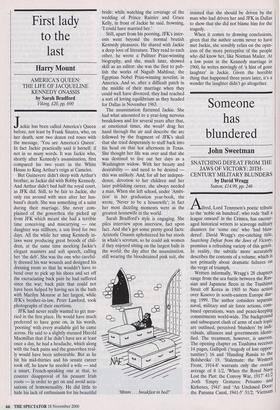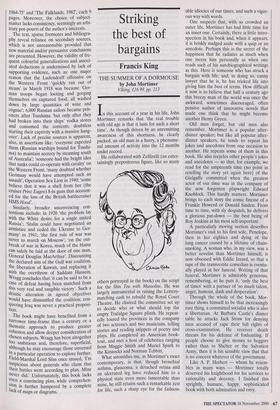Someone has blundered
John Sweetman
SNATCHING DEFEAT FROM THE JAWS OF VICTORY: 20TH- CENTURY MILITARY BLUNDERS by David Wragg Sutton, £14.99, pp. 246 Afred, Lord Tennyson's poetic tribute to the 'noble six hundred', who rode 'half a league onward' in the Crimea, has encour- aged historical writers to scavenge military disasters for 'some one' who 'had blun- dered'. David Wragg's eye-catching title, Snatching Defeat from the Jaws of Victory, promises a refreshing variety of this genre. In reality, the subtitle more accurately describes the contents of a volume, which is not primarily about dramatic failures on the verge of triumph. Written informally, Wragg's 28 chapters range from the sea battle between the Rus- sian and Japanese fleets in the Tsushima Strait off Korea in 1905 to Nato action over Kosovo in south-eastern Europe dur- ing 1999. The author considers separate naval, military and air force actions, com- bined operations, wars and peace-keeping commitments world-wide. The background and subsequent clash of arms of each topic are outlined, perceived 'blunders' by indi- viduals, alliances and governments identi- fied. The treatment, however, is uneven. The opening chapter on Tsushima receives 14 pages, Gallipoli (`tragedy of lost oppor- tunities') 16 and 'Handing Russia to the Bolsheviks' 19. 'Stalemate: the Western Front, 1914-8' warrants only the overall average of 8 1/2, 'When the Royal Navy Lost the Plot: the Convoy War, 1917' 41/2 ,both 'Empty Gestures: Petsamo and Kirkenes, 1941' and 'An Unclosed Door: the Panama Canal, 1941-5' 31/2; 'Vietnam 1964-75' and 'The Falklands, 1982', each 9 pages. Moreover, the choice of subject- matter lacks consistency, seemingly an arbi- trary pot-pourri of the author's interests. The text, sparse footnotes and bibliogra- phy reveal reliance on secondary sources, which is not unreasonable provided that new material and/or persuasive conclusions are presented. However, the validity of fre- quent colourful generalisations and associ- ated deductions is undermined by lack of supporting evidence, such as: one major reason that the Ludendorff offensive on the Western Front 'quickly ran out of steam' in March 1918 was because 'Ger- man troops began looting and gorging themselves on captured food, all washed down by large quantities of wine and cognac'; 6,000 Russian sailors became pris- oners after Tsushima 'but only after they had broken into their ships' vodka stores and consumed the contents, doubtless starting their captivity with a massive hang- over'. Lack of precise sources is apparent, also, in assertions like: 'everyone expected them (Russian warships bound for Tsushi- ma) to maintain secrecy by steaming south of Australia'; 'someone had the bright idea that tanks could co-operate with cavalry' on the Western Front; 'many doubted whether Germany would have attempted such an assault', Operation Sea Lion in 1940; 'some believe that it was a shell from her (the cruiser Prinz Eugen) 8-in guns that account- ed for the loss of the British battlecruiser HMS Hood'.
Similarly, broader unconvincing con- tentions include: in 1920 'the problem lay with the White desire for a single united Russia'; 'Stalin could have negotiated an armistice and ceded the Ukraine to Ger- many' in 1941; 'the first rule of war was never to march on Moscow'; 'on the out- break of war in Korea, much of the blame can safely be laid at the door of one man, General Douglas MacArthur'. Discounting the declared aim of the Gulf war coalition, the liberation of Kuwait, and replacing it with the overthrow of Saddam Hussein, Wragg concludes that 'it can be said to be a case of defeat having been snatched from this very real and tangible victory'. Such a drastic alteration in agreed objectives Would have dismantled the coalition; con- quering Iraq was never a practical proposi- tion.
The book might have benefited from a narrower time-frame than a century or a thematic approach to produce greater cohesion and allow deeper consideration of chosen subjects. Wragg has been altogether too ambitious and, therefore, superficial, although he may encourage those unversed in a particular operation to explore further. Field-Marshal Lord Slim once mused, 'I'm suspicious about generals who claim that their battles went according to plan. Mine never did.' Unfortunately, this book lacks even a convincing plan, while comprehen- sion is further hampered by a complete lack of maps or diagrams.



































































































 Previous page
Previous page